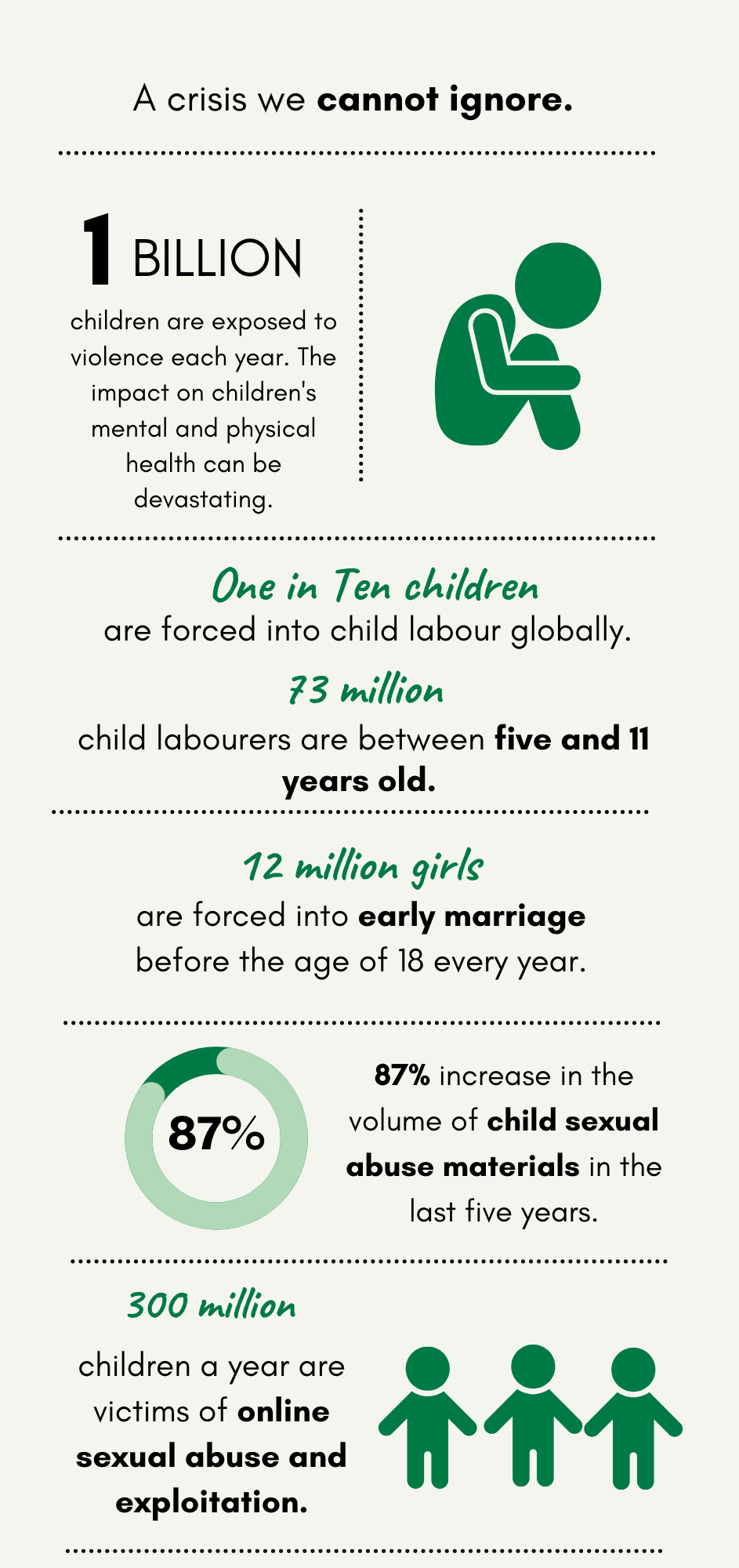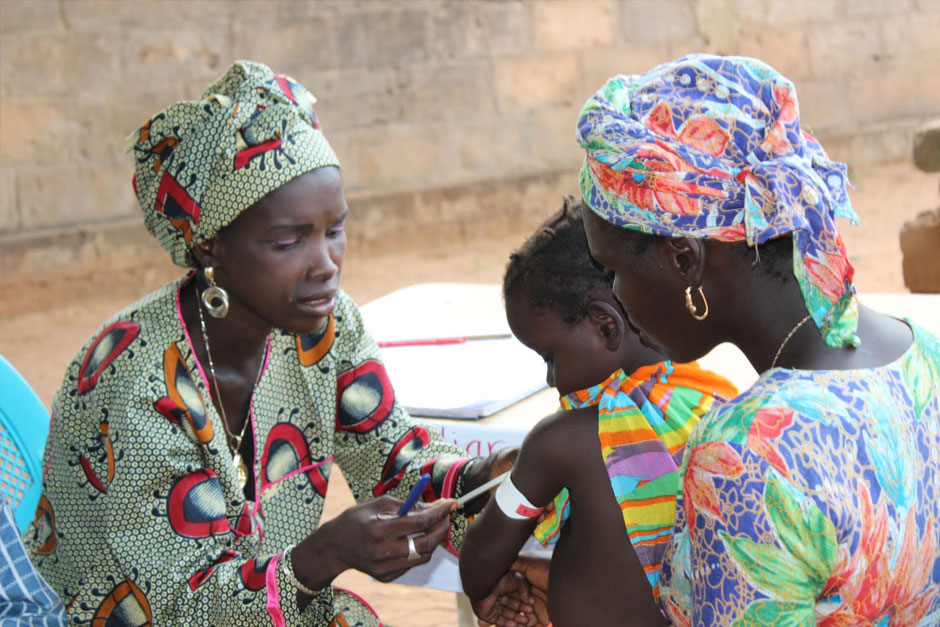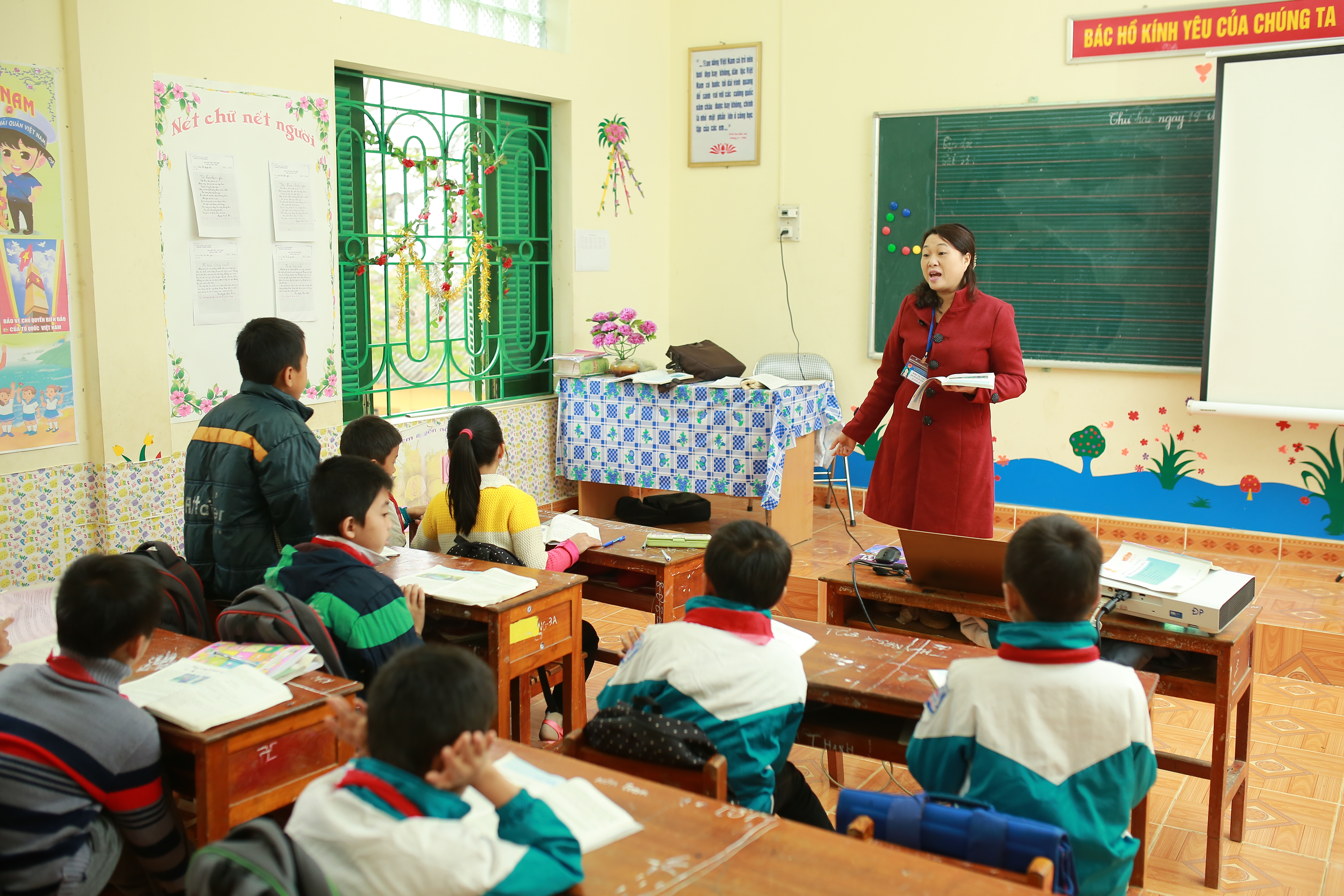Millions of children worldwide experience the worst violations of their rights each day. When a child is exploited, they are stripped of their right to education, to live free from violence and to grow up healthy.
At ChildFund Australia, we believe that every child should experience a childhood in which they are nurtured, protected and given access to opportunity. We have extensive programs aimed at preventing exploitation and supporting vulnerable children globally. Through our child protection program, we work in partnership with national governments, civil society and communities to raise awareness of child protection issues and implement protective measures that keep children safe from harm.
Here are some of the ways we protect children from exploitation:
- Provide support: We help strengthen community and national child protection systems to ensure children experiencing violence can access the support mechanisms they need to stay safe.
- Local partnerships: We work with local partners during humanitarian emergencies and protracted crises to protect children from exploitation, including forced marriage, child labour and sexual exploitation.
- Digital literacy: We work with children, young people, caregivers and educators to improve their digital literacy skills and understanding of online safety.
Keep reading to learn more about what is classified as child exploitation and how ChildFund Australia and our local partners are tackling some of the biggest threats to children’s safety, including early marriage, child labour and online child exploitation.
What is Child Exploitation?
Simply put, exploitation occurs when someone takes advantage of another person for their own benefit.
The rights of children to be protected from exploitation are outlined in the UN Convention on the Rights of the Child (UNCRC) of which Australia is a signatory. The specific definition of child exploitation is outlined in Article 36, which refers to child exploitation as any situation where a child is abused, harmed or used by another person for economic, sexual or personal gain.
The legal definition of exploitation remains notably broad to capture the range of forms of violence that can be committed against children. This is because child exploitation is multi-faceted issue that includes practices like:
Child Labour
Many children and young people across the world engage in paid and unpaid work like helping around the house or taking on a job during the school holidays. These activities can help children in their development. However, poverty, displacement and violence has driven many other children into hazardous forms of work. This is what we would refer to as child labour. For instance, factories where children are forced to work long hours under harsh conditions for little or no compensation.
Child labour is any work that deprives children of their rights, dignity and childhood, and that is harmful to their physical and mental wellbeing. Globally, one in ten children, accounting for 160 million children, are forced into child labour. In the world’s poorest countries this increases to more than one in five children. The consequences of child labour for the rights and wellbeing of the child are immense. In nearly every case, children are forced to leave school, and often less likely to access the health care they need.
Child Trafficking
Trafficking occurs all over the world, and 27 percent of all human trafficking victims are children. Both boys and girls are vulnerable to child trafficking and can be trafficked for a range of reasons like forced labour, recruitment into armed groups or sexual exploitation. However, girls are disproportionately targeted, and make up two out of every three child victims. Girls are often trafficked for forced marriages or sexual exploitation.
Child Online Exploitation
As the digital world and social media platforms become an integral part of children and young people’s everyday lives, the risk of online child sexual exploitation has grown exponentially. Child online sexual exploitation refers to the use of technology or the internet to facilitate the sexual abuse of a child. Most commonly this includes grooming, live streaming, consuming child sexual abuse material, and coercing and blackmailing children for sexual purposes.
Reports indicate that the volume of child sexual abuse material has increased by 87% in the last 5 years. A recent report by the ChildLight Global Child Safety Institute revealed that more than 300 million children a year are victims of online sexual abuse and exploitation. This is a problem of global scale that requires real solutions to keep children safe online.

All forms of child exploitation have an immense impact on the wellbeing, development and rights of children and young people. Ending child exploitation is critical to guaranteeing all children can enjoy a childhood free from harm.
What makes a child vulnerable to exploitation?
Poverty
Poverty is a significant factor in heightening a child’s vulnerability to exploitation. When families are facing financial challenges, and in the absence of community or government welfare or safety nets, children may be more likely to be forced into work or early marriage to support their families.
In many communities, child protection structures that could prevent child exploitation and help survivors are either non-existence or ill equipped to respond to the violence children face at home, in the community and from strangers. We are working with partners in Cambodia, Papua New Guinea, Solomon Islands, Timor-Leste, Vietnam and Bangladesh to strengthen formal and community-based child protection mechanisms, improving child protection case management and referral pathways.
Harmful gender norms
Discrimination and structural gender inequalities create conditions that drive women and girls’ vulnerability to violence and exploitation. Harmful gender norms contribute to increasing women and girls’ risk of experiencing exploitation and violence, these include:
- the normalisation of gender-based violence
- lack of autonomy over financial resources
- unequal access to education
- lack of representation of women in decision-making processes
Every year, 12 million girls are forced into early marriage before the age of 18, and one in five girls are married in childhood across the globe. Early marriage robs girls of their childhood and threatens both their wellbeing and futures. When a girl is forced to marry before the age of 18, she is more likely to drop out of school, experience domestic violence, and have worse health outcomes than her peers.
Conflict and Displacement
For children living in conflict zones, or who have been displaced from their homes, the risk of exploitation is multiplied. For instance, children living in precarious conditions, such as in refugee camps, are more vulnerable to trafficking, exploitation and forced labour.
In the world’s largest refugee camp in Cox’s Bazar, Bangladesh, child labour, gender-based violence, early marriage and exploitation are real threats children face every day.
ChildFund is working with our local partner, EDUCO, to set up child friendly spaces where children can learn, play and connect. These spaces are helping children to understand their rights and the protection issues they might face in the camp, including early marriage and child labour.
What makes children vulnerable to online exploitation?
The internet has revolutionised the way children and young people socialise, unlocking new ways of learning, accessing information and communicating. It has become an essential part of their daily lives bringing immense and exciting possibilities. But the digital space – whether on social media, online gaming or messaging sites – exposes children to malicious actors, and potential harm.
In the online world, children are at risk of:
- child online sexual exploitation and abuse
- economic exploitation
- sextortion and
- trafficking
However, the remarkably rapid fast-paced development of the online world means that the risks young people face online can put governments, civil society, parents, teachers and young people on the back foot when it comes to responding to online safety risks. Primary research conducted by ChildFund Australia in the Pacific and South-East Asia found that while children and young people are confident in their online abilities, they do not always have the digital skills or awareness to protect themselves online.
Online safety for children is a top priority for ChildFund Australia, and we are helping children and their communities to take action to protect their rights and wellbeing in the online world through our Swipe Safe program and app. All children should have a safe online experience, and Swipe Safe puts online safety solutions in the hands of young people so that they can enjoy the benefits and opportunities that come with a more connected world.
ChildFund Australia’s role in combating Child Exploitation
Combating child exploitation requires collective action. It is the role of governments, communities, civil society, educators and caregivers to ensure the protection of children. Here at ChildFund, we work with local partners and government agencies to build and strengthen child protection mechanisms alongside supporting children, caregivers and educators to learn more about the exploitation risks facing children in their community.
Keeping young people safe online in Laos
Phouthdavanh, 14, is a youth trainer in her community in Sayabouly Province, and is helping her friends interact safely online. Through ChildFund’s online safety training course, Phouthdavanh has gained invaluable knowledge and skills, becoming more aware of online risks and a more confident communicator. She says she now recognises the crucial role young people like herself can play in highlighting children’s rights in the digital world.
“I have learnt how to encourage young individuals to think critically and take necessary measures to protect their personal information and adopt safe social media practices,” says Phouthdavanh, adding she now understands the potential dangers of revealing too much online.
Strengthening formal child protection systems in Vietnam
Vietnam’s National Child Helpline (NCHL) has been instrumental in prioritising child protection across the country since its launch in 2004. The helpline receives over 500,000 calls annually and recently launched a dedicated app to reach more children and their communities.
Luu (11), from Hoa Binh province, says she feels much safer knowing that she can ask for help with just a click of a button: “It’s like I have another friend to protect me. I use the app to report issues such as bullying or violence. Plus, it’s really easy to use.”
ChildFund Vietnam, together with the Department of Child Affairs, has made important upgrades to App 111 to strengthen and expand the country’s Child Protection System and Service for children and their families.
Protecting displaced children from exploitation
At just 15, Minul* has become an active advocate in his community for the rights and wellbeing of children. Living in the world’s largest refugee camp in Cox’s Bazar, Bangladesh since he was ten years old, Minul has faced countless threats of exploitation and violence. But, since joining ChildFund and EDUCO’s Adolescent Boys Club, run at one of our child friendly spaces, he has gained important life skills, and become an advocate against child labour and early marriage.
“I have seen the distressing reality of children becoming victims of child marriage and child labour, and it deeply troubles me,” Minul says. “However, as a member of the Adolescent Boys Club, I am now in a position to help stop these harmful practices.”
Tackling Child Exploitation Together
There are many ways you can help protect children from exploitation. To make a difference today you could:
- Donate: When you support one of our appeals or child protection programs, you are helping children and young people to stay safe.
- Fundraise: Host an activity or event to raise much-needed funds for one of our child protection programs. It can be as easy as setting up a Facebook fundraiser or hosting an event with your friends, family or community.
- Speak out: If you think a child might be a victim of online harm or exploitation then you can learn more about how to deal with different types of serious online abuse and the steps you can take for reporting on the eSafety Commissioner website.
By supporting ChildFund Australia’s initiatives and spreading awareness about different forms of violence against children, individuals and communities can contribute to building a safer world for children, so that they may grow up free from exploitation and harm. Donate today and help keep children safe from harm.
FAQs About Child Exploitation
Child exploitation refers to when a child is taken advantage of, abused or harmed by another person, whether economically, sexually or through other means. The core element of child exploitation is the abusive use of power or trust to manipulate and control the exploited person.
Child exploitation incorporates a range of forms of violence against children, including:
- Child labour
- Early marriage
- Child trafficking
- Online child exploitation
- Child sexual exploitation
Child labour is an example of exploitation and defined as any work that deprives children of their rights and is harmful to their physical and mental wellbeing. For instance, children may be exploited in domestic work or forced to work in dangerous or hazardous conditions, where they are unpaid or underpaid and cannot leave due to threats or lack of alternatives.
Children may also face threats of exploitation online, including grooming, and coercion and blackmail for sexual purposes. Over the last five years, the volume of child sexual abuse material has increased by 87%, and this will likely only grow as more children come online and AI software becomes more readily available.
Child exploitation material (CEM) refers to any content depicting the abuse of children, such as child pornography. International laws, like the Optional Protocol on the Rights of the Child on the Sale of Children, Child Prostitution, and Child Pornography, aim to combat the creation and distribution of CEM.
You can learn more about ChildFund’s child protection initiatives and policies here.
*Names have been changed to protect individuals’ identities.




